Bribery, political interference and direct threats – finally someone says it how it is, right? The outgoing President of the Pacific island group Micronesia names some pillars of Chinese brute diplomacy. In fact, there are complaints in many parts of the world – including Germany – about how the People’s Republic uses shady methods to represent its interests in the world. But this usually happens behind closed doors. And in the end, they usually turn a blind eye because it is China.
The fact that the President of the small state is now even talking about severing ties with Beijing and is instead looking to Taiwan is political dynamite, as Michael Radunski analyzes. For decades, the trend has been exactly the opposite. But in the face of growing international skepticism towards China, such a decision could generate a lot of attention in the world and give new impetus to Taiwan’s diplomatic activities.
Micronesia’s demand of 50 million US dollars from Taiwan in return also sounds dishonest at first. But upon closer examination, the withdrawal of dozens of states from Taiwan and their turning towards the People’s Republic had exactly the same reason: financial interests.
In the medium term, however, China will hardly have to worry about a wave of diplomatic crises driving the country into isolation. Especially if the government behaves as charmingly as the new Premier Li Qiang did during his inaugural speech to the Americans. Joern Petring listened to Li and noticed that China’s new head of government struck a level-headed tone vis-à-vis Washington. The USA is not Micronesia, after all.

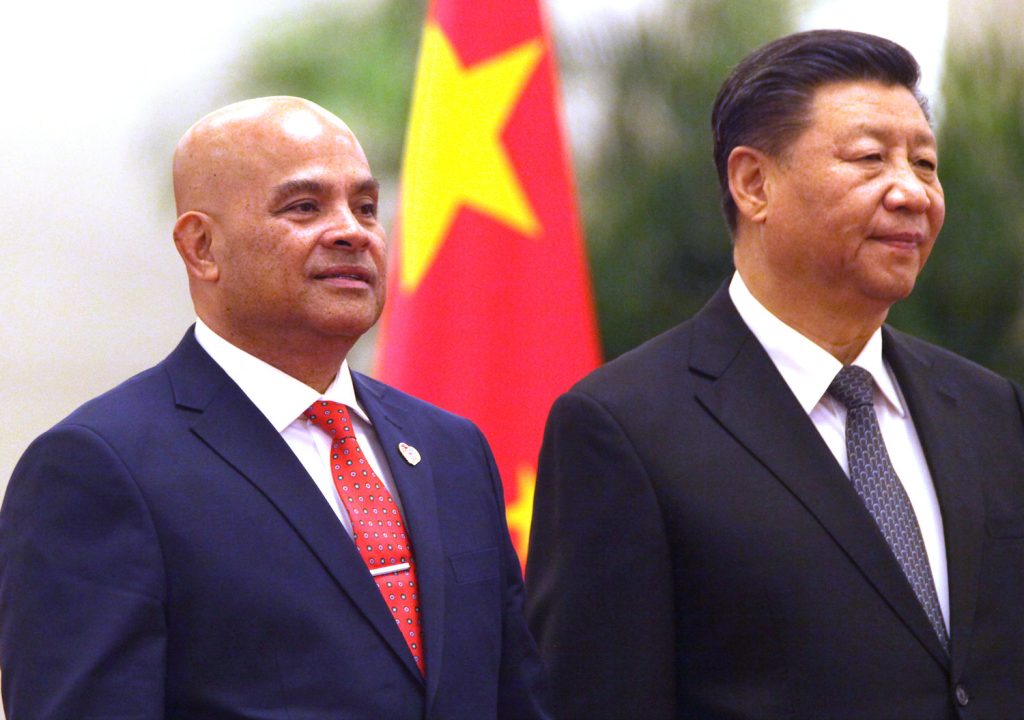
It is a letter from the pen of David Panuelo that carries a politically highly explosive message. On 13 pages, the outgoing president of Micronesia gets even with China – and wants to establish diplomatic relations with Taiwan instead. In doing so, he has dared to do two things at once:
In the letter to the governors of the individual states of Micronesia as well as to other political leaders, Panuelo accuses China of preparing an invasion of Taiwan. Beijing is trying to secure Micronesia’s loyalty or neutrality, he writes. China expects Micronesia to side with it or at least abstain in the event of war against the US. Panuelo explains in detail how China plans to achieve this: With bribery, political interference and direct threats.
Because of these practices, Panuelo advocates ending diplomatic relations with China. Instead, the Federated States of Micronesia should rather establish relations with Taiwan. Panuelo does not mince his words on this point either – and demands 50 million US dollars from Taiwan in return.
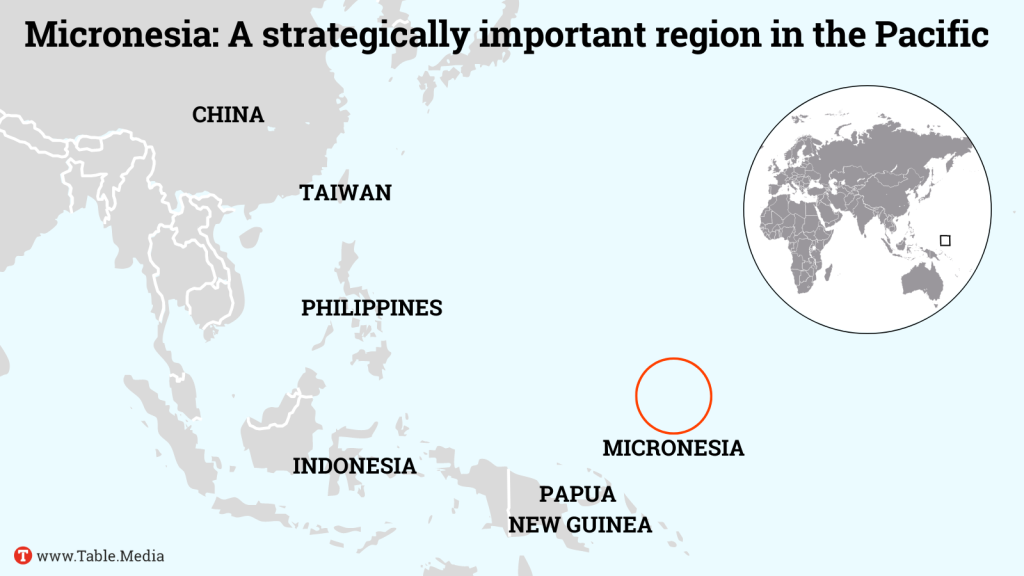
“I was transparent with foreign minister Wu; we project we need an injection of approximately 50 million US dollars to meet our future needs. We can and will receive this, over a three-year period, if and when we establish diplomatic relations with Taiwan,” the Guardian quoted from the letter. In addition, they would also receive an annual “assistance package” of 15 million US dollars.
Panuelo’s accusations tie in with incidents in other countries. For example, he complains of Chinese espionage under the guise of research in the country’s maritime territory – comparable to the recent balloon incident over the United States. he also accuses Beijing of attempting to control important communication and military infrastructures – a fact that could find echoes in the German Huawei debate or the controversial agreement with the Solomon Islands.
“Simply put, we are witnessing political warfare in our country,” Panuelo writes. This would include overt activities such as political alliances, economic measures and public propaganda, as well as covert activities such as “bribery, psychological warfare, and blackmail”. Panuelo has been president of Micronesia since 2019. However, after losing the last election, he will leave office in two months.
It is not the first time Panuelo has warned about China’s growing influence in the South Pacific. Last May, when China tried to sign “security agreements” with the Solomon Islands and other Pacific island states, Panuelo warned his counterparts against becoming too dependent on Beijing. He said there was a risk of being drawn into a dispute between China and the USA. China withdrew its plan at that time.
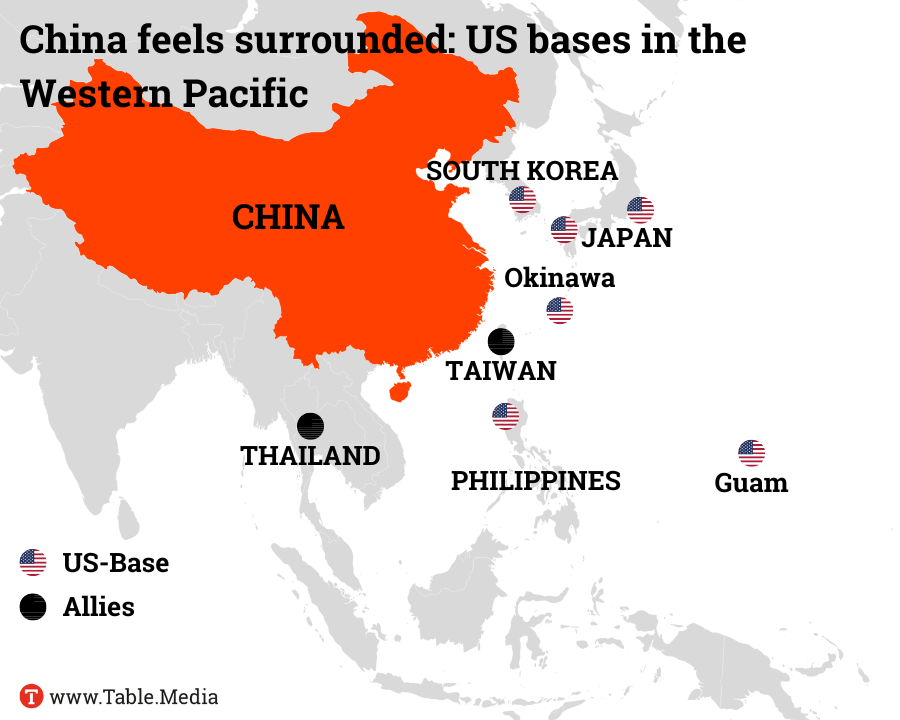
Crucial to all this is the so-called island chain strategy of US foreign policy expert John Foster Dulles. China is trying to break through an encirclement – and expand its reach beyond the first island chain consisting of Taiwan, the Koreas and Japan. In addition, Pacific states like the Solomon Islands are located on the central SLOC (sea line of communication) between Australia and the United States. These sea lines are essential for trade and logistics, but also for the movement of naval forces.
As a result, a diplomatic race for the countless island states in the Pacific has broken out, in which the roles have been clearly distributed so far. While the West grossly neglected the Pacific states for years, China has launched countless projects: A national sports stadium for the Pacific Games on the Solomon Islands, highways in Papua New Guinea and bridges on Fiji. Germany, of all countries, reacted quickly here when Foreign Minister Annalena Baerbock appointed diplomat Beate Grzeski as Germany’s first special ambassador to the Pacific island states.
Because China is ahead even at the highest level. Xi Jinping has already visited the region twice – in 2014 and 2018. US President Joe Biden, on the other hand, has so far only promised the Pacific states that he will visit the region “in the near future”. Micronesia’s explosive letter would be a good reason to do so.
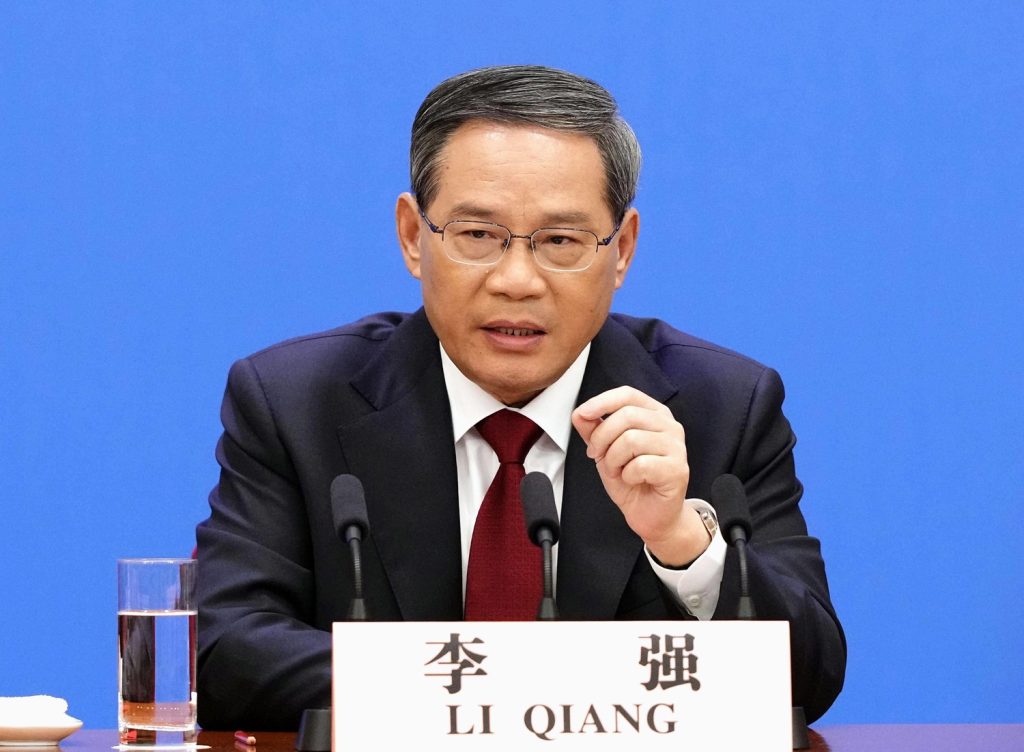
The first major appearance of China’s new head of government Li Qiang has been promising from a business perspective. Both domestic and foreign companies in China recently fared similarly: On the one hand, they felt an upswing after the end of zero-Covid. They preferred to wait and see what signals the National People’s Congress (NPC) would send before making big investment decisions.
Li demonstrated a sensitivity to this mood. He tried to spread new confidence. He was aware that there had been “wrong discussions” last year that had “worried the companies”. Li was likely referring to the doomsday atmosphere shortly after the Party Congress last fall. When Xi Jinping presented his new leadership team full of loyal followers, panic set in. Many observers concluded that the new government constellation was not very business-friendly.
But Li refused to let that stand on Monday. He began a remarkably long plea for the private sector. “Cadres at all levels should sincerely care for and serve private enterprises,” Li demanded. The whole society must be made to create a good atmosphere of respect for entrepreneurs and enterprises. The new Premier pledged that his government would “promote fair competition among various business entities, and support the development and growth of private enterprises“.
This was well received by investors. Share prices on the Shanghai and Hong Kong stock exchanges rose sharply on Monday. During the week-long session of the People’s Congress, the indices had mostly fallen.
Business leaders were probably also pleased with Li’s remarks on foreign policy. Li is considered a close confidant of Xi Jinping and his enforcer. Last week, Foreign Minister Qin Gang and also President Xi warned the US against further cornering China. Li, on the other hand, tried a positive approach. He often heard the word “decoupling” in recent years, Li said. But he did not know who would benefit from it.
The trade volume between China and the USA reached a new all-time high last year, he said. “Each benefits from the other’s development,” Li said. He looked back positively on his “numerous meetings with executives of foreign companies” during his time as Shanghai Party chief: “Cooperation between China and the US has great potential,” Li said. “Siege and oppression” are not good for anyone.
Although he belongs to a different political school of thought, the new Li sounded like his predecessor Li Keqiang in many respects. The latter had also tried his best not to sound as statist as the president. “Most people do not keep their eyes on GDP growth all the time. What they care more about are the things that happen in their everyday life, like housing, employment, income, education, medical services and environment.” In his many years as a local politician, he added, he has made an important observation: “Those who only sit in the office mainly see problems. Those who go to the people find solutions,” Li said.
The Premier backed businesses, but also made it clear that there will be major challenges to overcome. China faces many uncertainties, instabilities and unpredictable events, the Premier said. Stabilizing economic growth is “not an easy task,” not just for China but for all countries in the world. It will not be easy for China to achieve “around five percent” growth as planned, he said. This would require additional efforts.
His comments on the Covid pandemic were probably also less well-received. As party leader of Shanghai, Li oversaw the two-month lockdown of the metropolis. There were some chaotic scenes during this period. But there was no sign of self-criticism on Monday. China achieved a “great victory”. During the pandemic, China “always adhered to the principle that people come first”, Li continued. China’s strategies and measures were “absolutely right”.
Late Monday night, China announced it will resume issuing almost all types of visas to foreigners starting March 15. This was first reported by the AP news agency in a breaking news story. It is another important step out of the self-imposed “zero-Covid” isolation.
As the financial news service Bloomberg reports, citing the Chinese embassy in the USA, China will also resume visa-free entry to several destinations. This involves, for example, the island of Hainan. Likewise, the rule applies to cruise ships stopping in Shanghai or people from Hong Kong and Macau who wish to enter via Guangdong.
On January 8, China already lifted the strict quarantine rules for inbound travelers. Passengers now only need to present a negative rapid antigen test to board a flight to China.
A look at the numbers shows just how dramatically the People’s Republic isolated itself during the Covid pandemic: According to the Ministry of Public Security, there were just under 116 million flights in and out of the country in 2022 – less than one-fifth of the number of flights than in 2019, the year before the Covid pandemic. rad
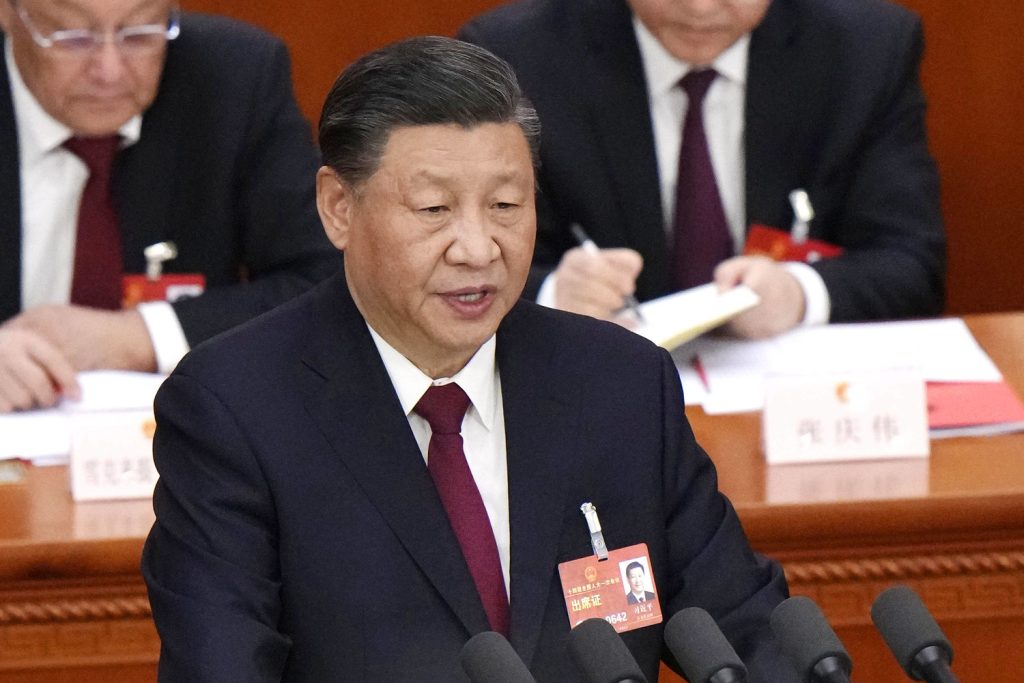
At the conclusion of the National People’s Congress in Beijing, President Xi Jinping once again addressed the approximately 3,000 delegates with pithy words. China’s military is to become a “Great wall of steel”, Xi said on Monday in the Great Hall of the People.
Xi, who is also chairman of the Central Military Commission, went on to say that the expansion of the military is important to strengthen China’s national and public security. “Security is the foundation of development, while stability is a prerequisite for prosperity.” At the beginning of the NPC about a week ago, delegates approved a military budget increase of 7.2 percent and other measures.
On Monday, Xi called for a “reunification” with Taiwan, saying the unification process must be unswervingly advanced. Xi did not repeat earlier statements that Beijing would not rule out military force. Instead, relations are to be developed peacefully. However, Xi said that external interference and divisive activities by Taiwanese independence forces must be resolutely opposed.
In addition, China must gain more independence and strength in the fields of science and technology. The background is likely to be the USA’s plans to further hinder China’s access to top technologies. rad
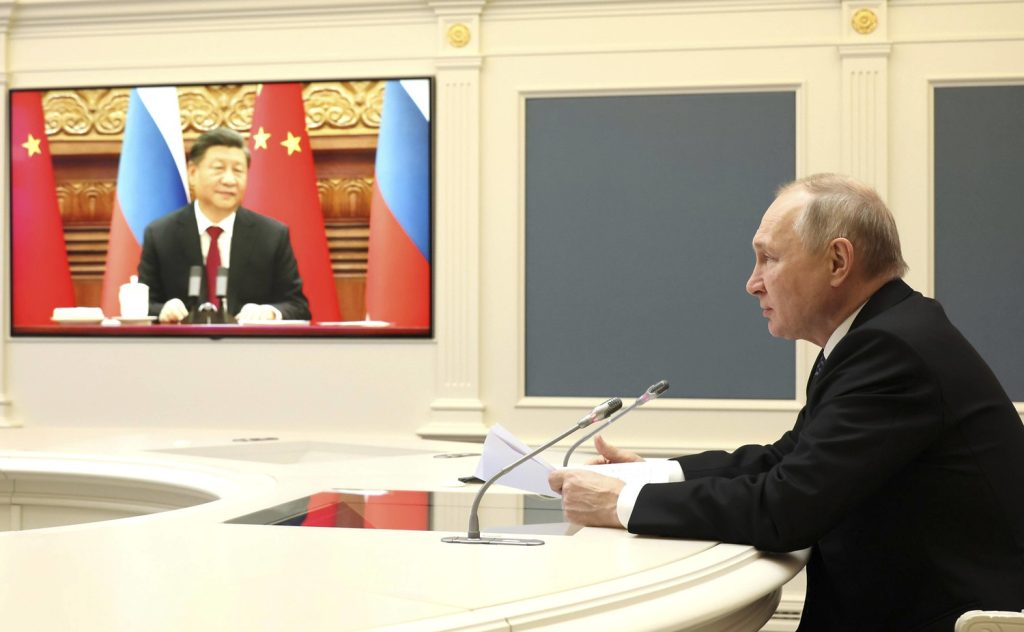
China’s President Xi Jinping is apparently planning to visit Moscow next week. This was reported by Reuters on Monday, citing information from people familiar with the plan who, however, wished to remain anonymous because of the sensitive nature of the topic. Xi reportedly wants to meet Russian President Vladimir Putin in Moscow.
In addition, Xi Jinping is also said to be planning talks with Ukrainian President Volodymyr Zelenskiy. This was reported by the Wall Street Journal. The talks will presumably take place after Xi visits Moscow.
Over the weekend, China successfully brokered between Saudi Arabia and Iran. Some observers, therefore, hope that Beijing could take on a similar role in the Ukraine war and mediate between Moscow and Kyiv. To this end, China recently presented a 12-point plan, which, however, was met with skepticism in the West. However, shortly before the Russian invasion of Ukraine began, China and Russia pledged a “borderless” partnership.
There was initially no comment from the Chinese Foreign Ministry. The Foreign Ministry in Moscow declined to comment. Putin already announced a possible visit by Xi to Moscow in February. At that time, China’s highest-ranking foreign policy official Wang Yi had visited the Russian capital for consultations. rad
Germany’s telecommunications providers Telekom, Vodafone and Telefónica Germany want to delay the removal of functioning components of Chinese providers from their networks for as long as possible. This was reported by the German newspaper Welt am Sonntag. From the outset, the companies expressed their dissatisfaction with the imminent policy change of the German government. Three years ago, the Ministry of Economics declared the intention to continue working with Chinese companies such as Huawei as 5G network equipment suppliers.
According to the report in Welt am Sonntag, the head of the department for cybersecurity in the German Federal Ministry of the Interior last week sent an email to the 5G managers of the companies, requesting them to list all critical components that were made by the manufacturers Huawei and ZTE. The list needs to be ready by the beginning of April.
The telecommunications companies regard this approach as unprofessional. “The whole thing comes as a complete surprise,” the newspaper quotes one of the addressees. “Normally, something like this would be announced in a conversation and then be sent to the executive board via registered letter, not via email to a department head.”
About half of Germany’s cellular stations operate with Huawei technology. The geopolitical goals regarding China are therefore endangering the digitalization goals from the perspective of the telecommunications providers. They now want to delay the switch away from Huawei. They can declare large shares of their equipment “non-security-critical” and challenge the assessment that the equipment would endanger Germany’s security. fin
The British government has decided on a tougher stance towards China. With “swift and robust action”, the UK wants to counter the “epoch-defining and systemic challenge” posed by China. That is the gist of the UK’s newly revised security strategy, published on Monday.
The paper originally dates from 2021 and was revised for the first time after the Russian attack on Ukraine. The version now in force announces the creation of a National Protective Security Authority. This new security authority is to provide more intelligence on threats posed by foreign agents. These include the People’s Republic and Russia, but also other actors. grz
Jiang Yanyong 蒋彦永 is dead. The 91-year-old died at his home in Beijing, according to Hong Kong publisher Bao Pu. Jiang informed the global public about the true extent of the spread and danger of the lung disease SARS almost exactly 20 years ago. Since 2019, the physician has been under house arrest for his repeated demands for clarification of the Tiananmen massacre.
Jiang alerted Chinese and foreign media to the danger of the SARS virus in early April 2003. The reports exposed the Chinese authorities’ account as a lie and called the World Health Organization (WHO) into action. Eventually, Beijing managed to prevent the further spread of the virus. Worldwide, the first Sars epidemic resulted in 8,422 infected and 919 deaths.
But Jiang was mainly a thorn in the Communist Party’s side for his refusal to remain silent about his experiences surrounding 4 June 1889. As chief physician and surgeon at Beijing Military Hospital 301, he and his colleagues had treated and performed surgery on 89 people injured with gunshot wounds on that tragic night. In 2019, he called the army operation the “worst crime” committed by the state leadership. Since then, Jiang has been under house arrest. grz
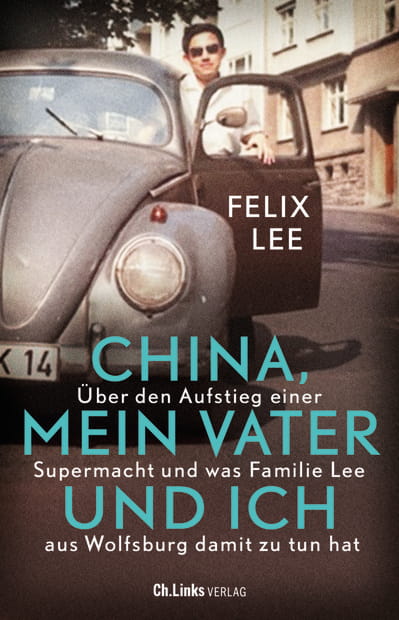
On 17 April 1978, Wenpo Lee is head of the research department at Volkswagen in Wolfsburg. He parted ways with China – until a Chinese delegation arrived at the factory gate. Wenpo Lee went on to become one of the architects of VW’s China business. At the same time, he experienced how the country mastered its rise to economic power.
“Wenpo, do you still speak your mother tongue?” shouted an employee of Volkswagen’s press department excitedly into the telephone on 17 April 1978.
Wenpo is my father and, back then, was head of a research department for the development of fuel-efficient engines at VW in Wolfsburg. Fuel-injected engines were still a new technology, which until then had mainly been used in expensive cars. Now a variant was to be developed that would be suitable for the mass segment, for a car that everyone could afford. This also involved alternative fuels. Climate change and carbon emissions were not yet an issue, but the oil price crisis of 1973 was still fresh in many people’s minds. There were also the first reports about acid rain and forest dieback. And the fact that harmful exhaust emissions could not go on forever was also on my father’s mind. Twenty years later, the FSI engine his team was working on at the time would be used in the VW Lupo. But that was still a distant vision at the time – and not the reason for the phone call that morning.
Could he come over? There are a few Chinese at the gate. Nobody knows what they want. One of them claimed to be the Chinese Minister of Mechanical Engineering.
Of course, my father still knew Chinese. However, he doubted that a Chinese minister was standing outside the factory gate. He did not even consider it likely that they were from the People’s Republic. Probably the gentlemen were more likely from Japan, perhaps from Southeast Asia. His colleague from the press department was not the only one to whom Asians all looked alike. My father had often been mistaken for a Japanese or a Vietnamese.
My father was preoccupied with data evaluations and test results on the way to the unexpected visitors, but he was a little curious to see who he was about to meet. But he had no idea that this morning would not only turn his life around but that German and Chinese economic history would also be made.
Up until then, my father rarely had any reason to enter the famous main building of the company with its brown clinker brick façade and the large VW logo on the roof. It was the tallest building in Wolfsburg. At the top, on the twelfth and thirteenth floors, were the bosses, members of the board of directors, as they were officially called.
When he reached the building, there were indeed five Chinese standing in the entrance area. They had been brought here from the factory gate in the meantime. With one look, my father realized they were not Japanese, Taiwanese, nor Chinese immigrants from the USA. Four of them were wearing a suit and tie, one had on a blue-grey jacket and pants in the same color, a standard suit that had been common in China since the founding of the Republic in 1912.
Guenter Hartwich, production manager and member of the VW board of management, gave a short welcoming speech. The men looked a bit lost, but upon seeing my father, their faces lightened up. They were visibly relieved to see a fellow countryman. And when my father spoke to them in Chinese, they seemed downright delighted. One of them was named Yang Keng, who was clearly the leader, judging by his demeanor. The name did not ring any bells with my father. And why should it, over the years, China had become almost as foreign to him as it had always been to most German citizens. Yang Keng introduced himself as a minister of the People’s Republic of China, responsible for agricultural and industrial machinery.
Yang Keng was tasked with expanding China’s automotive industry, which until then had largely consisted of the manufacturing of tractors and trucks. It was to include commercial vehicles for road transport, i.e. buses and large trucks. The minister bluntly admitted that his country was technically very backward, that they lacked the knowledge. That is why he came to Germany. He wanted to visit German vehicle manufacturers and learn from them. There was no talk of buying or selling a car for the moment.
My father was not particularly experienced at translating, but he gave his best to help both sides understand each other. At some points he had to elaborate a bit more and provide further explanations; simultaneous translation would not have sufficed, the worlds in which the interlocutors lived were too different.
My father had left the world from which the five delegation members came thirty years earlier. In the turmoil of the Chinese civil war, he fled from China to Taiwan in 1948 at the age of twelve and fended for himself there as a refugee boy until a teacher couple took him in and eventually brought him with them to Germany to study.
Things went well for him from the moment he arrived in the Federal Republic in 1962. He studied and earned his doctorate, and found a job as a development engineer at VW. With his first salary, my father bought a hi-fi system. In his student days in Aachen, he owned a VW Beetle, which he shared with a fellow student; in the meantime, my father drove a Passat. In the seventies, there were only very few foreigners at the plant who had made it to department manager. And, in fact, he was no longer a foreigner, since 1977 he held German citizenship, which meant he was a German. As such, he had traveled to China a few months earlier for the first time since fleeing to see his parents again. His hometown of Nanjing, like the entire country, was in a pitiful state.
The visit was made possible by China’s tentative opening since the death of Mao Tse-tung in September 1976. After some power struggles, Deng Xiaoping was on his way to the top of the government in 1978 and already introduced the first measures of his modernization course. So the fact that a Chinese delegation traveled to Germany to gain an insight into car production here did not come out of the blue, but was a sign of a development that was to progress steadily over the next few years.
Although it would take a few more years and numerous tough negotiations before the groundbreaking ceremony for the first joint venture plant in Shanghai, Volkswagen was nevertheless one of the first Western companies to open a branch in the emerging country with over one billion people in 1984.
Since then, Volkswagen has managed to occupy the top spot in car sales in China for more than three decades. VW is now losing this rank in the wake of electric mobility, where the Chinese competition is leading the way for the first time. Nevertheless, VW’s overall statistics are full of superlatives. The three plants that my father helped start in China in 1978 have now grown into thirty-four car and component plants. Every fifth new car in China comes from a VW factory. Volkswagen has created over 90,000 jobs in China in this way. Every second car VW produced in 2021 was sold to a Chinese.
The question of dependence immediately arises. It did not matter as long as China was an emerging but still underdeveloped country and the foreign companies were technologically, financially and also management-wise superior to the Chinese companies. And that is what China was for many years: modest, grateful, and at the same time keen to learn and inquisitive.
Felix Lee: “China, My Father and Me. On the Rise of a Superpower and What the Lee Family from Wolfsburg Has to Do with It,” German version, Ch. Links Verlag, 256 pages, ISBN 978-3-96289-169-5, also available as e-book. Published on March 14, 2023.
Holger Demuth has left the Swiss branch of China Construction Bank (CCB). This is reported by the financial blog Inside Paradeplatz. As COO and CFO, Demuth was responsible for the operational business as well as for the finances of the Swiss CCB branch.
Is something changing in your organization? Let us know at heads@table.media!
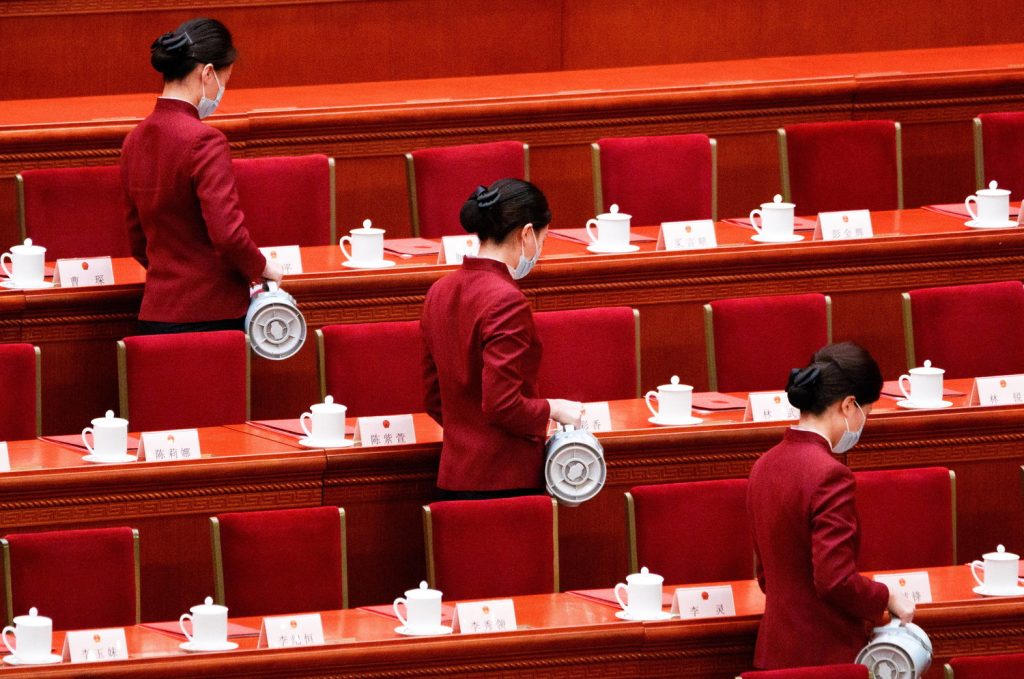
One last choreographed hot water pouring. China’s National People’s Congress ended in Beijing on Monday. The quota of women among the approximately 3,000 delegates this year is said to have been 26.5 percent – not counting these ladies.
Bribery, political interference and direct threats – finally someone says it how it is, right? The outgoing President of the Pacific island group Micronesia names some pillars of Chinese brute diplomacy. In fact, there are complaints in many parts of the world – including Germany – about how the People’s Republic uses shady methods to represent its interests in the world. But this usually happens behind closed doors. And in the end, they usually turn a blind eye because it is China.
The fact that the President of the small state is now even talking about severing ties with Beijing and is instead looking to Taiwan is political dynamite, as Michael Radunski analyzes. For decades, the trend has been exactly the opposite. But in the face of growing international skepticism towards China, such a decision could generate a lot of attention in the world and give new impetus to Taiwan’s diplomatic activities.
Micronesia’s demand of 50 million US dollars from Taiwan in return also sounds dishonest at first. But upon closer examination, the withdrawal of dozens of states from Taiwan and their turning towards the People’s Republic had exactly the same reason: financial interests.
In the medium term, however, China will hardly have to worry about a wave of diplomatic crises driving the country into isolation. Especially if the government behaves as charmingly as the new Premier Li Qiang did during his inaugural speech to the Americans. Joern Petring listened to Li and noticed that China’s new head of government struck a level-headed tone vis-à-vis Washington. The USA is not Micronesia, after all.


It is a letter from the pen of David Panuelo that carries a politically highly explosive message. On 13 pages, the outgoing president of Micronesia gets even with China – and wants to establish diplomatic relations with Taiwan instead. In doing so, he has dared to do two things at once:
In the letter to the governors of the individual states of Micronesia as well as to other political leaders, Panuelo accuses China of preparing an invasion of Taiwan. Beijing is trying to secure Micronesia’s loyalty or neutrality, he writes. China expects Micronesia to side with it or at least abstain in the event of war against the US. Panuelo explains in detail how China plans to achieve this: With bribery, political interference and direct threats.
Because of these practices, Panuelo advocates ending diplomatic relations with China. Instead, the Federated States of Micronesia should rather establish relations with Taiwan. Panuelo does not mince his words on this point either – and demands 50 million US dollars from Taiwan in return.

“I was transparent with foreign minister Wu; we project we need an injection of approximately 50 million US dollars to meet our future needs. We can and will receive this, over a three-year period, if and when we establish diplomatic relations with Taiwan,” the Guardian quoted from the letter. In addition, they would also receive an annual “assistance package” of 15 million US dollars.
Panuelo’s accusations tie in with incidents in other countries. For example, he complains of Chinese espionage under the guise of research in the country’s maritime territory – comparable to the recent balloon incident over the United States. he also accuses Beijing of attempting to control important communication and military infrastructures – a fact that could find echoes in the German Huawei debate or the controversial agreement with the Solomon Islands.
“Simply put, we are witnessing political warfare in our country,” Panuelo writes. This would include overt activities such as political alliances, economic measures and public propaganda, as well as covert activities such as “bribery, psychological warfare, and blackmail”. Panuelo has been president of Micronesia since 2019. However, after losing the last election, he will leave office in two months.
It is not the first time Panuelo has warned about China’s growing influence in the South Pacific. Last May, when China tried to sign “security agreements” with the Solomon Islands and other Pacific island states, Panuelo warned his counterparts against becoming too dependent on Beijing. He said there was a risk of being drawn into a dispute between China and the USA. China withdrew its plan at that time.

Crucial to all this is the so-called island chain strategy of US foreign policy expert John Foster Dulles. China is trying to break through an encirclement – and expand its reach beyond the first island chain consisting of Taiwan, the Koreas and Japan. In addition, Pacific states like the Solomon Islands are located on the central SLOC (sea line of communication) between Australia and the United States. These sea lines are essential for trade and logistics, but also for the movement of naval forces.
As a result, a diplomatic race for the countless island states in the Pacific has broken out, in which the roles have been clearly distributed so far. While the West grossly neglected the Pacific states for years, China has launched countless projects: A national sports stadium for the Pacific Games on the Solomon Islands, highways in Papua New Guinea and bridges on Fiji. Germany, of all countries, reacted quickly here when Foreign Minister Annalena Baerbock appointed diplomat Beate Grzeski as Germany’s first special ambassador to the Pacific island states.
Because China is ahead even at the highest level. Xi Jinping has already visited the region twice – in 2014 and 2018. US President Joe Biden, on the other hand, has so far only promised the Pacific states that he will visit the region “in the near future”. Micronesia’s explosive letter would be a good reason to do so.

The first major appearance of China’s new head of government Li Qiang has been promising from a business perspective. Both domestic and foreign companies in China recently fared similarly: On the one hand, they felt an upswing after the end of zero-Covid. They preferred to wait and see what signals the National People’s Congress (NPC) would send before making big investment decisions.
Li demonstrated a sensitivity to this mood. He tried to spread new confidence. He was aware that there had been “wrong discussions” last year that had “worried the companies”. Li was likely referring to the doomsday atmosphere shortly after the Party Congress last fall. When Xi Jinping presented his new leadership team full of loyal followers, panic set in. Many observers concluded that the new government constellation was not very business-friendly.
But Li refused to let that stand on Monday. He began a remarkably long plea for the private sector. “Cadres at all levels should sincerely care for and serve private enterprises,” Li demanded. The whole society must be made to create a good atmosphere of respect for entrepreneurs and enterprises. The new Premier pledged that his government would “promote fair competition among various business entities, and support the development and growth of private enterprises“.
This was well received by investors. Share prices on the Shanghai and Hong Kong stock exchanges rose sharply on Monday. During the week-long session of the People’s Congress, the indices had mostly fallen.
Business leaders were probably also pleased with Li’s remarks on foreign policy. Li is considered a close confidant of Xi Jinping and his enforcer. Last week, Foreign Minister Qin Gang and also President Xi warned the US against further cornering China. Li, on the other hand, tried a positive approach. He often heard the word “decoupling” in recent years, Li said. But he did not know who would benefit from it.
The trade volume between China and the USA reached a new all-time high last year, he said. “Each benefits from the other’s development,” Li said. He looked back positively on his “numerous meetings with executives of foreign companies” during his time as Shanghai Party chief: “Cooperation between China and the US has great potential,” Li said. “Siege and oppression” are not good for anyone.
Although he belongs to a different political school of thought, the new Li sounded like his predecessor Li Keqiang in many respects. The latter had also tried his best not to sound as statist as the president. “Most people do not keep their eyes on GDP growth all the time. What they care more about are the things that happen in their everyday life, like housing, employment, income, education, medical services and environment.” In his many years as a local politician, he added, he has made an important observation: “Those who only sit in the office mainly see problems. Those who go to the people find solutions,” Li said.
The Premier backed businesses, but also made it clear that there will be major challenges to overcome. China faces many uncertainties, instabilities and unpredictable events, the Premier said. Stabilizing economic growth is “not an easy task,” not just for China but for all countries in the world. It will not be easy for China to achieve “around five percent” growth as planned, he said. This would require additional efforts.
His comments on the Covid pandemic were probably also less well-received. As party leader of Shanghai, Li oversaw the two-month lockdown of the metropolis. There were some chaotic scenes during this period. But there was no sign of self-criticism on Monday. China achieved a “great victory”. During the pandemic, China “always adhered to the principle that people come first”, Li continued. China’s strategies and measures were “absolutely right”.
Late Monday night, China announced it will resume issuing almost all types of visas to foreigners starting March 15. This was first reported by the AP news agency in a breaking news story. It is another important step out of the self-imposed “zero-Covid” isolation.
As the financial news service Bloomberg reports, citing the Chinese embassy in the USA, China will also resume visa-free entry to several destinations. This involves, for example, the island of Hainan. Likewise, the rule applies to cruise ships stopping in Shanghai or people from Hong Kong and Macau who wish to enter via Guangdong.
On January 8, China already lifted the strict quarantine rules for inbound travelers. Passengers now only need to present a negative rapid antigen test to board a flight to China.
A look at the numbers shows just how dramatically the People’s Republic isolated itself during the Covid pandemic: According to the Ministry of Public Security, there were just under 116 million flights in and out of the country in 2022 – less than one-fifth of the number of flights than in 2019, the year before the Covid pandemic. rad

At the conclusion of the National People’s Congress in Beijing, President Xi Jinping once again addressed the approximately 3,000 delegates with pithy words. China’s military is to become a “Great wall of steel”, Xi said on Monday in the Great Hall of the People.
Xi, who is also chairman of the Central Military Commission, went on to say that the expansion of the military is important to strengthen China’s national and public security. “Security is the foundation of development, while stability is a prerequisite for prosperity.” At the beginning of the NPC about a week ago, delegates approved a military budget increase of 7.2 percent and other measures.
On Monday, Xi called for a “reunification” with Taiwan, saying the unification process must be unswervingly advanced. Xi did not repeat earlier statements that Beijing would not rule out military force. Instead, relations are to be developed peacefully. However, Xi said that external interference and divisive activities by Taiwanese independence forces must be resolutely opposed.
In addition, China must gain more independence and strength in the fields of science and technology. The background is likely to be the USA’s plans to further hinder China’s access to top technologies. rad

China’s President Xi Jinping is apparently planning to visit Moscow next week. This was reported by Reuters on Monday, citing information from people familiar with the plan who, however, wished to remain anonymous because of the sensitive nature of the topic. Xi reportedly wants to meet Russian President Vladimir Putin in Moscow.
In addition, Xi Jinping is also said to be planning talks with Ukrainian President Volodymyr Zelenskiy. This was reported by the Wall Street Journal. The talks will presumably take place after Xi visits Moscow.
Over the weekend, China successfully brokered between Saudi Arabia and Iran. Some observers, therefore, hope that Beijing could take on a similar role in the Ukraine war and mediate between Moscow and Kyiv. To this end, China recently presented a 12-point plan, which, however, was met with skepticism in the West. However, shortly before the Russian invasion of Ukraine began, China and Russia pledged a “borderless” partnership.
There was initially no comment from the Chinese Foreign Ministry. The Foreign Ministry in Moscow declined to comment. Putin already announced a possible visit by Xi to Moscow in February. At that time, China’s highest-ranking foreign policy official Wang Yi had visited the Russian capital for consultations. rad
Germany’s telecommunications providers Telekom, Vodafone and Telefónica Germany want to delay the removal of functioning components of Chinese providers from their networks for as long as possible. This was reported by the German newspaper Welt am Sonntag. From the outset, the companies expressed their dissatisfaction with the imminent policy change of the German government. Three years ago, the Ministry of Economics declared the intention to continue working with Chinese companies such as Huawei as 5G network equipment suppliers.
According to the report in Welt am Sonntag, the head of the department for cybersecurity in the German Federal Ministry of the Interior last week sent an email to the 5G managers of the companies, requesting them to list all critical components that were made by the manufacturers Huawei and ZTE. The list needs to be ready by the beginning of April.
The telecommunications companies regard this approach as unprofessional. “The whole thing comes as a complete surprise,” the newspaper quotes one of the addressees. “Normally, something like this would be announced in a conversation and then be sent to the executive board via registered letter, not via email to a department head.”
About half of Germany’s cellular stations operate with Huawei technology. The geopolitical goals regarding China are therefore endangering the digitalization goals from the perspective of the telecommunications providers. They now want to delay the switch away from Huawei. They can declare large shares of their equipment “non-security-critical” and challenge the assessment that the equipment would endanger Germany’s security. fin
The British government has decided on a tougher stance towards China. With “swift and robust action”, the UK wants to counter the “epoch-defining and systemic challenge” posed by China. That is the gist of the UK’s newly revised security strategy, published on Monday.
The paper originally dates from 2021 and was revised for the first time after the Russian attack on Ukraine. The version now in force announces the creation of a National Protective Security Authority. This new security authority is to provide more intelligence on threats posed by foreign agents. These include the People’s Republic and Russia, but also other actors. grz
Jiang Yanyong 蒋彦永 is dead. The 91-year-old died at his home in Beijing, according to Hong Kong publisher Bao Pu. Jiang informed the global public about the true extent of the spread and danger of the lung disease SARS almost exactly 20 years ago. Since 2019, the physician has been under house arrest for his repeated demands for clarification of the Tiananmen massacre.
Jiang alerted Chinese and foreign media to the danger of the SARS virus in early April 2003. The reports exposed the Chinese authorities’ account as a lie and called the World Health Organization (WHO) into action. Eventually, Beijing managed to prevent the further spread of the virus. Worldwide, the first Sars epidemic resulted in 8,422 infected and 919 deaths.
But Jiang was mainly a thorn in the Communist Party’s side for his refusal to remain silent about his experiences surrounding 4 June 1889. As chief physician and surgeon at Beijing Military Hospital 301, he and his colleagues had treated and performed surgery on 89 people injured with gunshot wounds on that tragic night. In 2019, he called the army operation the “worst crime” committed by the state leadership. Since then, Jiang has been under house arrest. grz

On 17 April 1978, Wenpo Lee is head of the research department at Volkswagen in Wolfsburg. He parted ways with China – until a Chinese delegation arrived at the factory gate. Wenpo Lee went on to become one of the architects of VW’s China business. At the same time, he experienced how the country mastered its rise to economic power.
“Wenpo, do you still speak your mother tongue?” shouted an employee of Volkswagen’s press department excitedly into the telephone on 17 April 1978.
Wenpo is my father and, back then, was head of a research department for the development of fuel-efficient engines at VW in Wolfsburg. Fuel-injected engines were still a new technology, which until then had mainly been used in expensive cars. Now a variant was to be developed that would be suitable for the mass segment, for a car that everyone could afford. This also involved alternative fuels. Climate change and carbon emissions were not yet an issue, but the oil price crisis of 1973 was still fresh in many people’s minds. There were also the first reports about acid rain and forest dieback. And the fact that harmful exhaust emissions could not go on forever was also on my father’s mind. Twenty years later, the FSI engine his team was working on at the time would be used in the VW Lupo. But that was still a distant vision at the time – and not the reason for the phone call that morning.
Could he come over? There are a few Chinese at the gate. Nobody knows what they want. One of them claimed to be the Chinese Minister of Mechanical Engineering.
Of course, my father still knew Chinese. However, he doubted that a Chinese minister was standing outside the factory gate. He did not even consider it likely that they were from the People’s Republic. Probably the gentlemen were more likely from Japan, perhaps from Southeast Asia. His colleague from the press department was not the only one to whom Asians all looked alike. My father had often been mistaken for a Japanese or a Vietnamese.
My father was preoccupied with data evaluations and test results on the way to the unexpected visitors, but he was a little curious to see who he was about to meet. But he had no idea that this morning would not only turn his life around but that German and Chinese economic history would also be made.
Up until then, my father rarely had any reason to enter the famous main building of the company with its brown clinker brick façade and the large VW logo on the roof. It was the tallest building in Wolfsburg. At the top, on the twelfth and thirteenth floors, were the bosses, members of the board of directors, as they were officially called.
When he reached the building, there were indeed five Chinese standing in the entrance area. They had been brought here from the factory gate in the meantime. With one look, my father realized they were not Japanese, Taiwanese, nor Chinese immigrants from the USA. Four of them were wearing a suit and tie, one had on a blue-grey jacket and pants in the same color, a standard suit that had been common in China since the founding of the Republic in 1912.
Guenter Hartwich, production manager and member of the VW board of management, gave a short welcoming speech. The men looked a bit lost, but upon seeing my father, their faces lightened up. They were visibly relieved to see a fellow countryman. And when my father spoke to them in Chinese, they seemed downright delighted. One of them was named Yang Keng, who was clearly the leader, judging by his demeanor. The name did not ring any bells with my father. And why should it, over the years, China had become almost as foreign to him as it had always been to most German citizens. Yang Keng introduced himself as a minister of the People’s Republic of China, responsible for agricultural and industrial machinery.
Yang Keng was tasked with expanding China’s automotive industry, which until then had largely consisted of the manufacturing of tractors and trucks. It was to include commercial vehicles for road transport, i.e. buses and large trucks. The minister bluntly admitted that his country was technically very backward, that they lacked the knowledge. That is why he came to Germany. He wanted to visit German vehicle manufacturers and learn from them. There was no talk of buying or selling a car for the moment.
My father was not particularly experienced at translating, but he gave his best to help both sides understand each other. At some points he had to elaborate a bit more and provide further explanations; simultaneous translation would not have sufficed, the worlds in which the interlocutors lived were too different.
My father had left the world from which the five delegation members came thirty years earlier. In the turmoil of the Chinese civil war, he fled from China to Taiwan in 1948 at the age of twelve and fended for himself there as a refugee boy until a teacher couple took him in and eventually brought him with them to Germany to study.
Things went well for him from the moment he arrived in the Federal Republic in 1962. He studied and earned his doctorate, and found a job as a development engineer at VW. With his first salary, my father bought a hi-fi system. In his student days in Aachen, he owned a VW Beetle, which he shared with a fellow student; in the meantime, my father drove a Passat. In the seventies, there were only very few foreigners at the plant who had made it to department manager. And, in fact, he was no longer a foreigner, since 1977 he held German citizenship, which meant he was a German. As such, he had traveled to China a few months earlier for the first time since fleeing to see his parents again. His hometown of Nanjing, like the entire country, was in a pitiful state.
The visit was made possible by China’s tentative opening since the death of Mao Tse-tung in September 1976. After some power struggles, Deng Xiaoping was on his way to the top of the government in 1978 and already introduced the first measures of his modernization course. So the fact that a Chinese delegation traveled to Germany to gain an insight into car production here did not come out of the blue, but was a sign of a development that was to progress steadily over the next few years.
Although it would take a few more years and numerous tough negotiations before the groundbreaking ceremony for the first joint venture plant in Shanghai, Volkswagen was nevertheless one of the first Western companies to open a branch in the emerging country with over one billion people in 1984.
Since then, Volkswagen has managed to occupy the top spot in car sales in China for more than three decades. VW is now losing this rank in the wake of electric mobility, where the Chinese competition is leading the way for the first time. Nevertheless, VW’s overall statistics are full of superlatives. The three plants that my father helped start in China in 1978 have now grown into thirty-four car and component plants. Every fifth new car in China comes from a VW factory. Volkswagen has created over 90,000 jobs in China in this way. Every second car VW produced in 2021 was sold to a Chinese.
The question of dependence immediately arises. It did not matter as long as China was an emerging but still underdeveloped country and the foreign companies were technologically, financially and also management-wise superior to the Chinese companies. And that is what China was for many years: modest, grateful, and at the same time keen to learn and inquisitive.
Felix Lee: “China, My Father and Me. On the Rise of a Superpower and What the Lee Family from Wolfsburg Has to Do with It,” German version, Ch. Links Verlag, 256 pages, ISBN 978-3-96289-169-5, also available as e-book. Published on March 14, 2023.
Holger Demuth has left the Swiss branch of China Construction Bank (CCB). This is reported by the financial blog Inside Paradeplatz. As COO and CFO, Demuth was responsible for the operational business as well as for the finances of the Swiss CCB branch.
Is something changing in your organization? Let us know at heads@table.media!

One last choreographed hot water pouring. China’s National People’s Congress ended in Beijing on Monday. The quota of women among the approximately 3,000 delegates this year is said to have been 26.5 percent – not counting these ladies.

